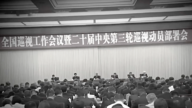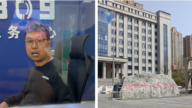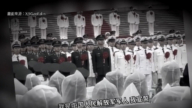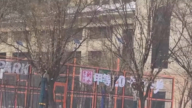【新唐人2011年8月30日讯】利比亚反对派兵临的黎波里,独裁统治42年的卡扎菲政权垮台了。首次展现国际社会“人权高于主权”的变天模式,也刺激中国网民反思中国社会。
“上海外国语大学”中东研究所副所长刘中民在发表的论述文章中,将发生在利比亚的变革称为“利比亚模式”。他将这个模式界定为“政治反对派发起内战+西方军事干预”。
刘中民认为,“利比亚模式”是否会成为西方对“失败国家”进行政权更迭的新模式,值得长期关注。
利比亚之战与阿富汗战争和伊拉克战争截然不同。受到“茉莉花革命”的影响,利比亚国内首先爆发了大规模反对卡扎菲独裁的示威,受到卡扎菲残酷镇压,造成至少数千人死亡。
利比亚领导人针对本国平民的屠杀行为,引起了国际社会震撼,在主权与人权的争议之中,联合国安理会五个常任理事国,全数赞成制裁利比亚。随后,北约联军出动空中力量,支援利比亚境内的反对派武装力量。直到六个月后,卡扎菲政权覆灭。
这是国际社会第一次展现“人权高于主权”的变天模式,也在中国大陆引起了热烈讨论。
微博上有不少网民针对“利比亚模式”是否适用于伊朗,朝鲜,叙利亚,进行发言,但更多是讨论对中国社会的影响。
网友刘萍196412说:“打假从选举开始!一人一票改变中国!”网友白林坡回道:“如不能如此,只能采取‘利比亚模式’了。”
浙江网友溪小流写道:“JD(建党)伟业里说,我们学习日本模式,失败了,学习美国模式,失败了,学习法国模式,失败了,学习俄国模式,也失败了。。。我们的出路是,利比亚模式。”
网友奥德赛黎明说:“经过#温州动车追尾坠桥#事件后,我清楚的感觉到:也许只有‘利比亚模式’才能解救我们。”
在中国网民热烈讨论“利比亚模式”的同时,中共当局的表态随着卡扎菲的倒台也发生微妙变化。
8月22号,在卡扎非政权摇摇欲坠时,中共外交部发言人马朝旭通过官方网站发表简短声明说:“我们注意到近日利比亚形势发生的变化,中方尊重利比亚人民的选择,希望利局势尽快恢复稳定,人民过上正常的生活。中方愿与国际社会一道,在利未来重建中发挥积极作用。”
对此作家杨恒均在微博中写道:“这话有意思,什么叫“恢复稳定,过上正常的生活”?卡扎菲时代那叫稳定(吗)?那叫正常生活(吗)?另外,中方什么时候能够尊重中国人民的选择呢?”
利比亚是世界上排名第十二位的石油储量大国,卡扎菲倒台后,利比亚丰厚的石油资源的利益再分配,吸引着全球的关注。中共政府一方面低调调整外交口径,一方面,开始与利比亚新政府建立沟通管道。
六月底,就在卡扎菲政府特使、利比亚外长欧拜迪访华之后,班加西国家过渡委员会成员吉卜里勒也曾低调访华。“中国红十字会”则先后提供给班加西和的黎波里三千万人民币,及二千万人民币的人道主义援助。
新唐人记者尚燕、王明宇综合报导。
“Libyan Model” For China?
The Libyan opposition controlled the capital city Tripoli
as the 42-year dictatorship of Gaddafi collapsed.
This, for the first time, shows the international community
that “human rights overrides sovereignty."
This also provokes thoughts among Chinese netizens
about the Chinese society.
Liu Zhongmin, deputy director of the Middle East Institute
at Shanghai International Studies University,
named the Libyan revolution as
the “Libyan Model" in his review article.
He defined this model as “Political opposition launched
the civil war + Western military intervention."
Liu Zhongmin, deputy director of the Middle East Institute
at Shanghai International Studies University,
named the Libyan revolution as
the “Libyan Model" in his review article.
He defined this model as “Political opposition launched
the civil war + Western military intervention."
Liu said, whether the Libyan Model would become a new
model for the West to support the “failed states"
for a change of regime,
deserves a long-term deliberation.
The war in Libya is different from those
of Afghanistan and Iraq.
Inspired by “Jasmine Revolutions," massive demonstrations
broke out in Libya opposing Gaddafi’s dictatorship.
However, the demonstrators were attacked violently
by Gaddafi, with thousands of civilians killed.
The Libyan government’s massacre of civilians
shocked the international community.
UN Security Council’s five permanent members reached
consensus on imposing the sanctions against Libya.
Then NATO forces deployed airpower
in support of the armed forces of Libyan opposition.
Six months later, Gaddafi’s regime is completely overturned.
This is the first time the international community has shown
a model of overturning: “human rights override sovereignty."
It also provoked netizens’ widespread discussions in China.
Many microbloggers asked whether the Libyan Model could
be applied to countries like Iran, North Korea and Syria.
But more discussions were focusing on
the Libyan Model’s impact on Chinese society.
Netizen ‘Liu Ping 196412’ said: “Anti-counterfeit starts
with the election! One-head, one-vote can change China!”
Netizen ‘Bai Lin Po’ responded:
“The only choice is the Libyan Model.”
Netizen “Xi Xiaoliu” wrote:
“The film ‘Beginning of the Great Revival’ said that
we learned the Japanese Model, but failed.
We learned the American Model, but failed.
We learned the French Model, but failed.
And we learned the Russian Model, but also failed.
Our way out is the Libyan Model.”
Netizen ‘Odyssey Dawn’ commented:
“After the Wenzhou train crash,
I felt that perhaps only the Libyan Model
could rescue us Chinese.”
As Chinese netizens were in heated discussions
of the Libyan Model, and with Gaddafi’s imminent downfall,
the attitudes from Chinese Communist Party (CCP)
authorities showed a subtle change too.
On August 22, when Gaddafi’s regime was crumbling,
the CCP authorities published an online version
of Foreign Ministry Spokesman Ma Zhaoxu’s brief statement:
“We have noted the recent changes of the situation in Libya.
China respects the choice of the Libyan people and
hopes that Libya will restore stability as soon as possible,
and the people to lead a normal life. China stands ready to
play a positive role in the future reconstruction of Libya,
along with the international community.”
Writer Yang Junheng commented: “The statement is quite
interesting. What is “restore stability, to lead a normal life"?
Can you call the society in Gaddafi’s era stable?
Could people lead a normal life in that society?
Besides, when will the CCP authorities be able
to respect the Chinese people’s choice?"
Libya is the world’s 12th largest country
for oil reserves.
With Gaddafi’s downfall, a redistribution of Libya’s
rich oil resources attracts global attention.
The CCP laid low at its previous diplomatic remarks,
and on the other hand it began establishing new channels
of communication with Libya’s new government.
At the end of June, Gaddafi’s special envoy
and Libyan Foreign Minister Ou Baidi visited China.
Mahmud Jibrilof Libya’s Transitional National
also paid a low-key visit to Beijing previously.
China’s Red Cross provided humanitarian aid to Benghazi
and Tripoli of RMB 30 million and 20 million, respectively.
NTD reporters Shang Yan and Wang Mingyu

























